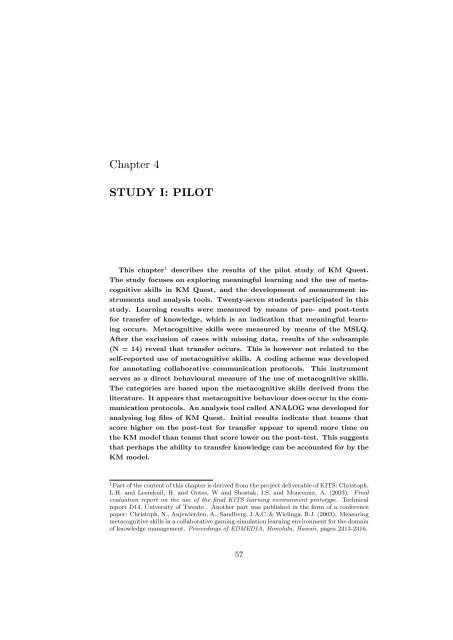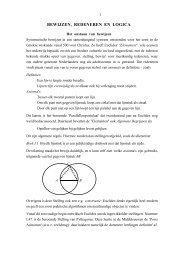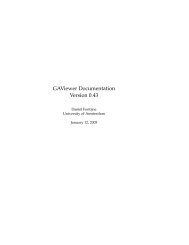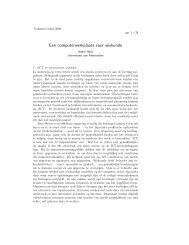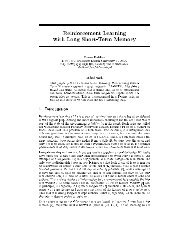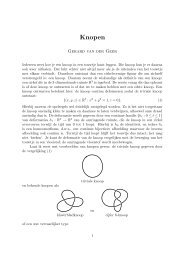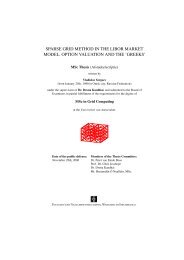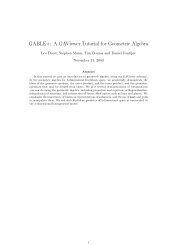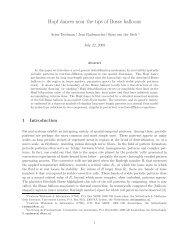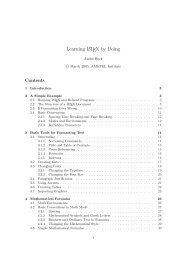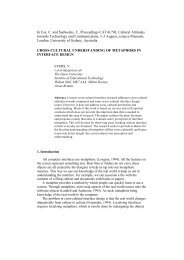The role of metacognitive skills in learning to solve problems
The role of metacognitive skills in learning to solve problems
The role of metacognitive skills in learning to solve problems
You also want an ePaper? Increase the reach of your titles
YUMPU automatically turns print PDFs into web optimized ePapers that Google loves.
Chapter 4<br />
STUDY I: PILOT<br />
This chapter 1 describes the results <strong>of</strong> the pilot study <strong>of</strong> KM Quest.<br />
<strong>The</strong> study focuses on explor<strong>in</strong>g mean<strong>in</strong>gful learn<strong>in</strong>g and the use <strong>of</strong> <strong>metacognitive</strong><br />
<strong>skills</strong> <strong>in</strong> KM Quest, and the development <strong>of</strong> measurement <strong>in</strong>struments<br />
and analysis <strong>to</strong>ols. Twenty-seven students participated <strong>in</strong> this<br />
study. Learn<strong>in</strong>g results were measured by means <strong>of</strong> pre- and post-tests<br />
for transfer <strong>of</strong> knowledge, which is an <strong>in</strong>dication that mean<strong>in</strong>gful learn<strong>in</strong>g<br />
occurs. Metacognitive <strong>skills</strong> were measured by means <strong>of</strong> the MSLQ.<br />
After the exclusion <strong>of</strong> cases with miss<strong>in</strong>g data, results <strong>of</strong> the subsample<br />
(N = 14) reveal that transfer occurs. This is however not related <strong>to</strong> the<br />
self-reported use <strong>of</strong> <strong>metacognitive</strong> <strong>skills</strong>. A cod<strong>in</strong>g scheme was developed<br />
for annotat<strong>in</strong>g collaborative communication pro<strong>to</strong>cols. This <strong>in</strong>strument<br />
serves as a direct behavioural measure <strong>of</strong> the use <strong>of</strong> <strong>metacognitive</strong> <strong>skills</strong>.<br />
<strong>The</strong> categories are based upon the <strong>metacognitive</strong> <strong>skills</strong> derived from the<br />
literature. It appears that <strong>metacognitive</strong> behaviour does occur <strong>in</strong> the communication<br />
pro<strong>to</strong>cols. An analysis <strong>to</strong>ol called ANALOG was developed for<br />
analys<strong>in</strong>g log files <strong>of</strong> KM Quest. Initial results <strong>in</strong>dicate that teams that<br />
score higher on the post-test for transfer appear <strong>to</strong> spend more time on<br />
the KM model than teams that score lower on the post-test. This suggests<br />
that perhaps the ability <strong>to</strong> transfer knowledge can be accounted for by the<br />
KM model.<br />
1 Part <strong>of</strong> the content <strong>of</strong> this chapter is derived from the project deliverable <strong>of</strong> KITS: Chris<strong>to</strong>ph,<br />
L.H. and Leemkuil, H. and Ootes, W and Shostak, I.S. and Monceaux, A. (2003). F<strong>in</strong>al<br />
evaluation report on the use <strong>of</strong> the f<strong>in</strong>al KITS learn<strong>in</strong>g environment pro<strong>to</strong>type. Technical<br />
report D14, University <strong>of</strong> Twente . Another part was published <strong>in</strong> the form <strong>of</strong> a conference<br />
paper: Chris<strong>to</strong>ph, N., Anjewierden, A., Sandberg, J.A.C. & Wiel<strong>in</strong>ga, B.J. (2003). Measur<strong>in</strong>g<br />
<strong>metacognitive</strong> <strong>skills</strong> <strong>in</strong> a collaborative gam<strong>in</strong>g-simulation learn<strong>in</strong>g environment for the doma<strong>in</strong><br />
<strong>of</strong> knowledge management. Proceed<strong>in</strong>gs <strong>of</strong> EDMEDIA, Honolulu, Hawaii, pages 2313-2316.<br />
57


